Analyzing Recession's Influence on London Restaurant Trade
VerifiedAdded on 2019/12/03
|25
|8503
|211
Report
AI Summary
This report investigates the influence of the recession on the restaurant trade in London. It begins with an introduction outlining the challenges faced by the industry, followed by a literature review exploring previous research and the economic context. The research aims to analyze the impact of the recession on consumer behavior, trade practices, and the comparative effects on the hospitality industry. The methodology section details the use of primary and secondary data collection methods. The report poses key research questions to guide the analysis, examining how restaurant owners have coped with declining demand, changes in offerings, and the overall business scenario since the recession. The research rationale emphasizes the study's significance in helping the London restaurant sector recover and implement sustainable development strategies. The structure of the report is outlined, including chapters on introduction, literature review, research methodology, findings and analysis, and conclusions and recommendations. The literature review discusses the impact of recession on consumer confidence, spending habits, and the challenges faced by restaurants in attracting customers, including competition from supermarkets and the need to provide value for money. The report aims to provide insights into strategies for the restaurant trade to survive and thrive during and after economic downturns.
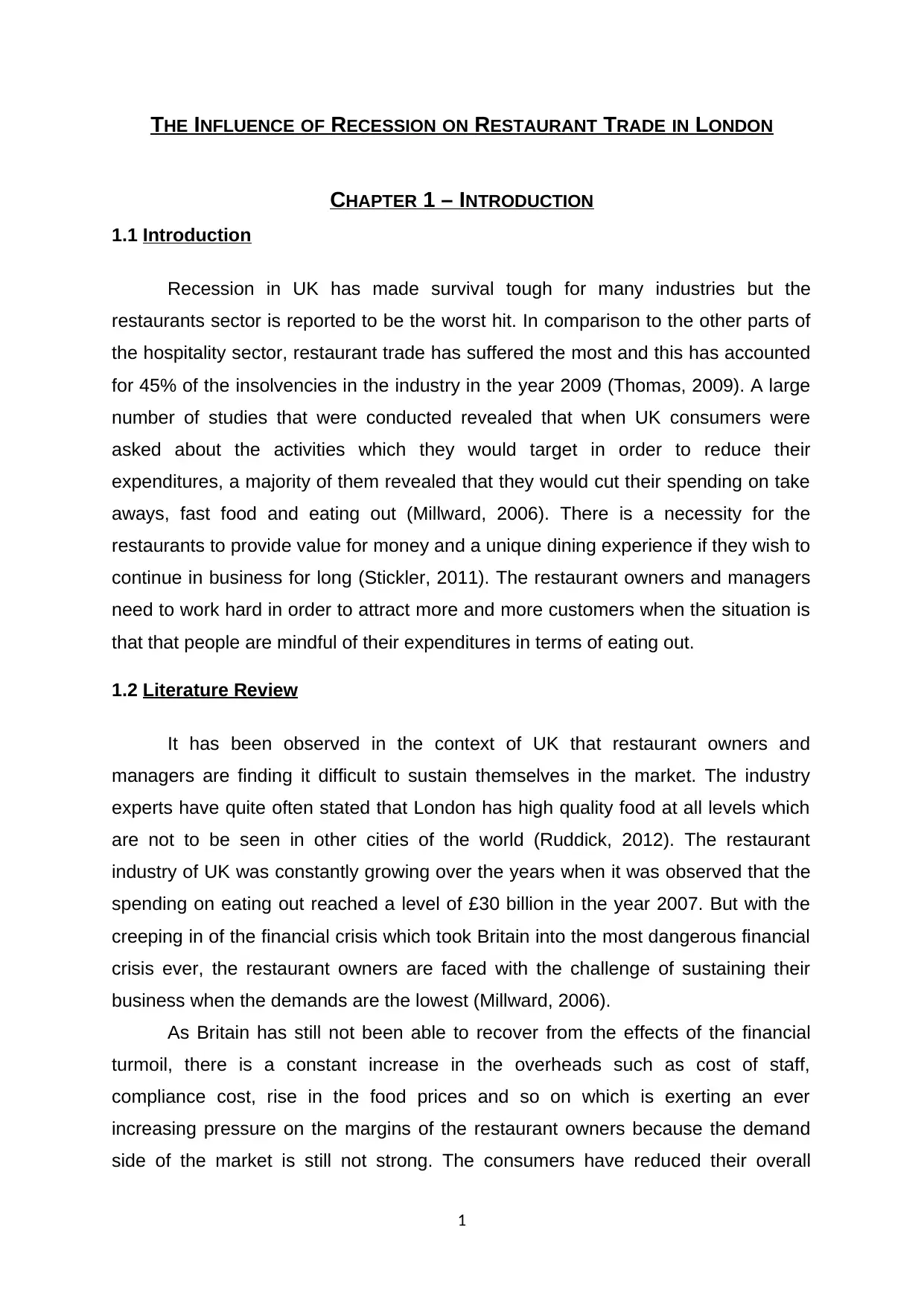
THE INFLUENCE OF RECESSION ON RESTAURANT TRADE IN LONDON
CHAPTER 1 – INTRODUCTION
1.1 Introduction
Recession in UK has made survival tough for many industries but the
restaurants sector is reported to be the worst hit. In comparison to the other parts of
the hospitality sector, restaurant trade has suffered the most and this has accounted
for 45% of the insolvencies in the industry in the year 2009 (Thomas, 2009). A large
number of studies that were conducted revealed that when UK consumers were
asked about the activities which they would target in order to reduce their
expenditures, a majority of them revealed that they would cut their spending on take
aways, fast food and eating out (Millward, 2006). There is a necessity for the
restaurants to provide value for money and a unique dining experience if they wish to
continue in business for long (Stickler, 2011). The restaurant owners and managers
need to work hard in order to attract more and more customers when the situation is
that that people are mindful of their expenditures in terms of eating out.
1.2 Literature Review
It has been observed in the context of UK that restaurant owners and
managers are finding it difficult to sustain themselves in the market. The industry
experts have quite often stated that London has high quality food at all levels which
are not to be seen in other cities of the world (Ruddick, 2012). The restaurant
industry of UK was constantly growing over the years when it was observed that the
spending on eating out reached a level of £30 billion in the year 2007. But with the
creeping in of the financial crisis which took Britain into the most dangerous financial
crisis ever, the restaurant owners are faced with the challenge of sustaining their
business when the demands are the lowest (Millward, 2006).
As Britain has still not been able to recover from the effects of the financial
turmoil, there is a constant increase in the overheads such as cost of staff,
compliance cost, rise in the food prices and so on which is exerting an ever
increasing pressure on the margins of the restaurant owners because the demand
side of the market is still not strong. The consumers have reduced their overall
1
CHAPTER 1 – INTRODUCTION
1.1 Introduction
Recession in UK has made survival tough for many industries but the
restaurants sector is reported to be the worst hit. In comparison to the other parts of
the hospitality sector, restaurant trade has suffered the most and this has accounted
for 45% of the insolvencies in the industry in the year 2009 (Thomas, 2009). A large
number of studies that were conducted revealed that when UK consumers were
asked about the activities which they would target in order to reduce their
expenditures, a majority of them revealed that they would cut their spending on take
aways, fast food and eating out (Millward, 2006). There is a necessity for the
restaurants to provide value for money and a unique dining experience if they wish to
continue in business for long (Stickler, 2011). The restaurant owners and managers
need to work hard in order to attract more and more customers when the situation is
that that people are mindful of their expenditures in terms of eating out.
1.2 Literature Review
It has been observed in the context of UK that restaurant owners and
managers are finding it difficult to sustain themselves in the market. The industry
experts have quite often stated that London has high quality food at all levels which
are not to be seen in other cities of the world (Ruddick, 2012). The restaurant
industry of UK was constantly growing over the years when it was observed that the
spending on eating out reached a level of £30 billion in the year 2007. But with the
creeping in of the financial crisis which took Britain into the most dangerous financial
crisis ever, the restaurant owners are faced with the challenge of sustaining their
business when the demands are the lowest (Millward, 2006).
As Britain has still not been able to recover from the effects of the financial
turmoil, there is a constant increase in the overheads such as cost of staff,
compliance cost, rise in the food prices and so on which is exerting an ever
increasing pressure on the margins of the restaurant owners because the demand
side of the market is still not strong. The consumers have reduced their overall
1
Paraphrase This Document
Need a fresh take? Get an instant paraphrase of this document with our AI Paraphraser
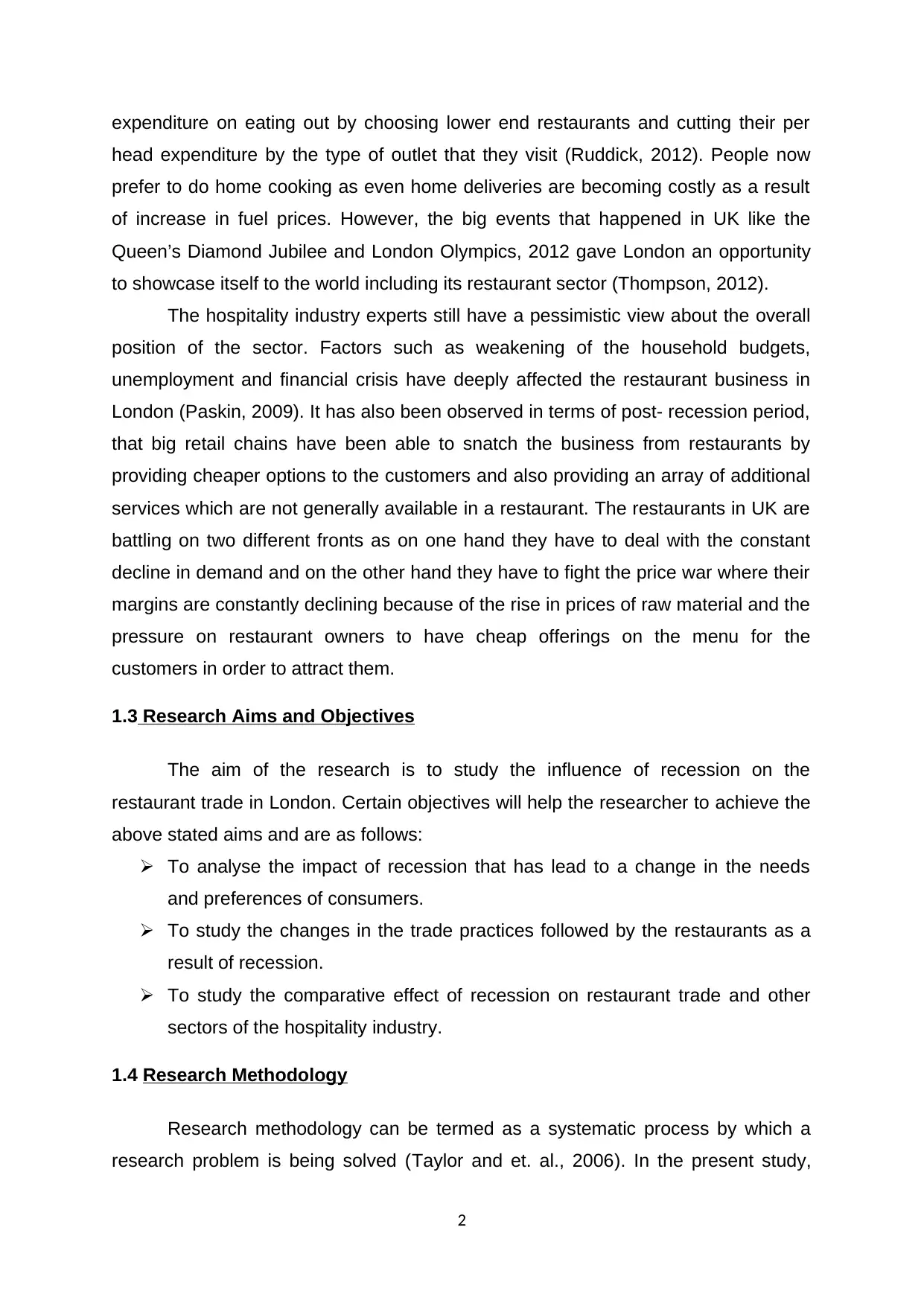
expenditure on eating out by choosing lower end restaurants and cutting their per
head expenditure by the type of outlet that they visit (Ruddick, 2012). People now
prefer to do home cooking as even home deliveries are becoming costly as a result
of increase in fuel prices. However, the big events that happened in UK like the
Queen’s Diamond Jubilee and London Olympics, 2012 gave London an opportunity
to showcase itself to the world including its restaurant sector (Thompson, 2012).
The hospitality industry experts still have a pessimistic view about the overall
position of the sector. Factors such as weakening of the household budgets,
unemployment and financial crisis have deeply affected the restaurant business in
London (Paskin, 2009). It has also been observed in terms of post- recession period,
that big retail chains have been able to snatch the business from restaurants by
providing cheaper options to the customers and also providing an array of additional
services which are not generally available in a restaurant. The restaurants in UK are
battling on two different fronts as on one hand they have to deal with the constant
decline in demand and on the other hand they have to fight the price war where their
margins are constantly declining because of the rise in prices of raw material and the
pressure on restaurant owners to have cheap offerings on the menu for the
customers in order to attract them.
1.3 Research Aims and Objectives
The aim of the research is to study the influence of recession on the
restaurant trade in London. Certain objectives will help the researcher to achieve the
above stated aims and are as follows:
To analyse the impact of recession that has lead to a change in the needs
and preferences of consumers.
To study the changes in the trade practices followed by the restaurants as a
result of recession.
To study the comparative effect of recession on restaurant trade and other
sectors of the hospitality industry.
1.4 Research Methodology
Research methodology can be termed as a systematic process by which a
research problem is being solved (Taylor and et. al., 2006). In the present study,
2
head expenditure by the type of outlet that they visit (Ruddick, 2012). People now
prefer to do home cooking as even home deliveries are becoming costly as a result
of increase in fuel prices. However, the big events that happened in UK like the
Queen’s Diamond Jubilee and London Olympics, 2012 gave London an opportunity
to showcase itself to the world including its restaurant sector (Thompson, 2012).
The hospitality industry experts still have a pessimistic view about the overall
position of the sector. Factors such as weakening of the household budgets,
unemployment and financial crisis have deeply affected the restaurant business in
London (Paskin, 2009). It has also been observed in terms of post- recession period,
that big retail chains have been able to snatch the business from restaurants by
providing cheaper options to the customers and also providing an array of additional
services which are not generally available in a restaurant. The restaurants in UK are
battling on two different fronts as on one hand they have to deal with the constant
decline in demand and on the other hand they have to fight the price war where their
margins are constantly declining because of the rise in prices of raw material and the
pressure on restaurant owners to have cheap offerings on the menu for the
customers in order to attract them.
1.3 Research Aims and Objectives
The aim of the research is to study the influence of recession on the
restaurant trade in London. Certain objectives will help the researcher to achieve the
above stated aims and are as follows:
To analyse the impact of recession that has lead to a change in the needs
and preferences of consumers.
To study the changes in the trade practices followed by the restaurants as a
result of recession.
To study the comparative effect of recession on restaurant trade and other
sectors of the hospitality industry.
1.4 Research Methodology
Research methodology can be termed as a systematic process by which a
research problem is being solved (Taylor and et. al., 2006). In the present study,
2
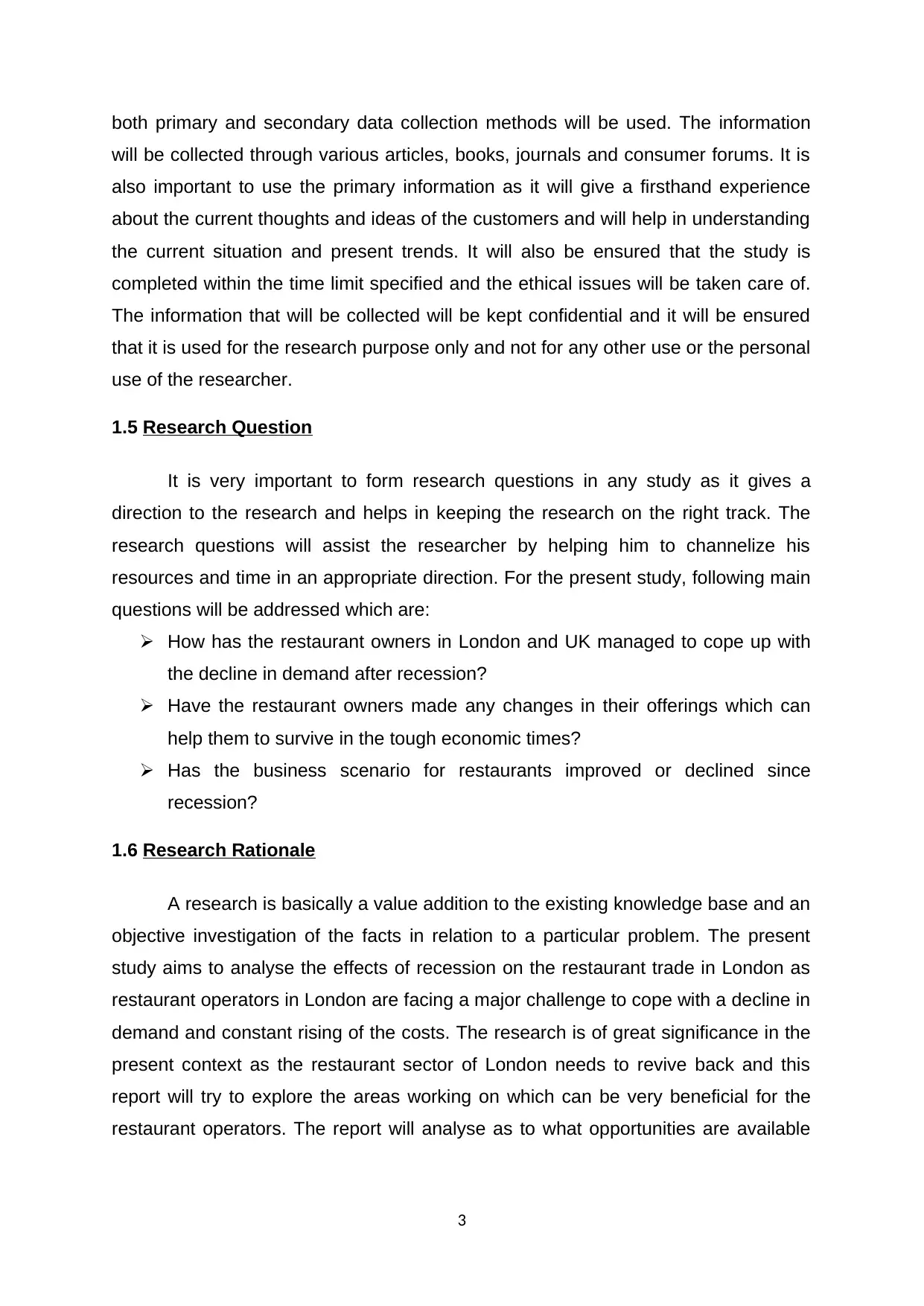
both primary and secondary data collection methods will be used. The information
will be collected through various articles, books, journals and consumer forums. It is
also important to use the primary information as it will give a firsthand experience
about the current thoughts and ideas of the customers and will help in understanding
the current situation and present trends. It will also be ensured that the study is
completed within the time limit specified and the ethical issues will be taken care of.
The information that will be collected will be kept confidential and it will be ensured
that it is used for the research purpose only and not for any other use or the personal
use of the researcher.
1.5 Research Question
It is very important to form research questions in any study as it gives a
direction to the research and helps in keeping the research on the right track. The
research questions will assist the researcher by helping him to channelize his
resources and time in an appropriate direction. For the present study, following main
questions will be addressed which are:
How has the restaurant owners in London and UK managed to cope up with
the decline in demand after recession?
Have the restaurant owners made any changes in their offerings which can
help them to survive in the tough economic times?
Has the business scenario for restaurants improved or declined since
recession?
1.6 Research Rationale
A research is basically a value addition to the existing knowledge base and an
objective investigation of the facts in relation to a particular problem. The present
study aims to analyse the effects of recession on the restaurant trade in London as
restaurant operators in London are facing a major challenge to cope with a decline in
demand and constant rising of the costs. The research is of great significance in the
present context as the restaurant sector of London needs to revive back and this
report will try to explore the areas working on which can be very beneficial for the
restaurant operators. The report will analyse as to what opportunities are available
3
will be collected through various articles, books, journals and consumer forums. It is
also important to use the primary information as it will give a firsthand experience
about the current thoughts and ideas of the customers and will help in understanding
the current situation and present trends. It will also be ensured that the study is
completed within the time limit specified and the ethical issues will be taken care of.
The information that will be collected will be kept confidential and it will be ensured
that it is used for the research purpose only and not for any other use or the personal
use of the researcher.
1.5 Research Question
It is very important to form research questions in any study as it gives a
direction to the research and helps in keeping the research on the right track. The
research questions will assist the researcher by helping him to channelize his
resources and time in an appropriate direction. For the present study, following main
questions will be addressed which are:
How has the restaurant owners in London and UK managed to cope up with
the decline in demand after recession?
Have the restaurant owners made any changes in their offerings which can
help them to survive in the tough economic times?
Has the business scenario for restaurants improved or declined since
recession?
1.6 Research Rationale
A research is basically a value addition to the existing knowledge base and an
objective investigation of the facts in relation to a particular problem. The present
study aims to analyse the effects of recession on the restaurant trade in London as
restaurant operators in London are facing a major challenge to cope with a decline in
demand and constant rising of the costs. The research is of great significance in the
present context as the restaurant sector of London needs to revive back and this
report will try to explore the areas working on which can be very beneficial for the
restaurant operators. The report will analyse as to what opportunities are available
3
⊘ This is a preview!⊘
Do you want full access?
Subscribe today to unlock all pages.

Trusted by 1+ million students worldwide
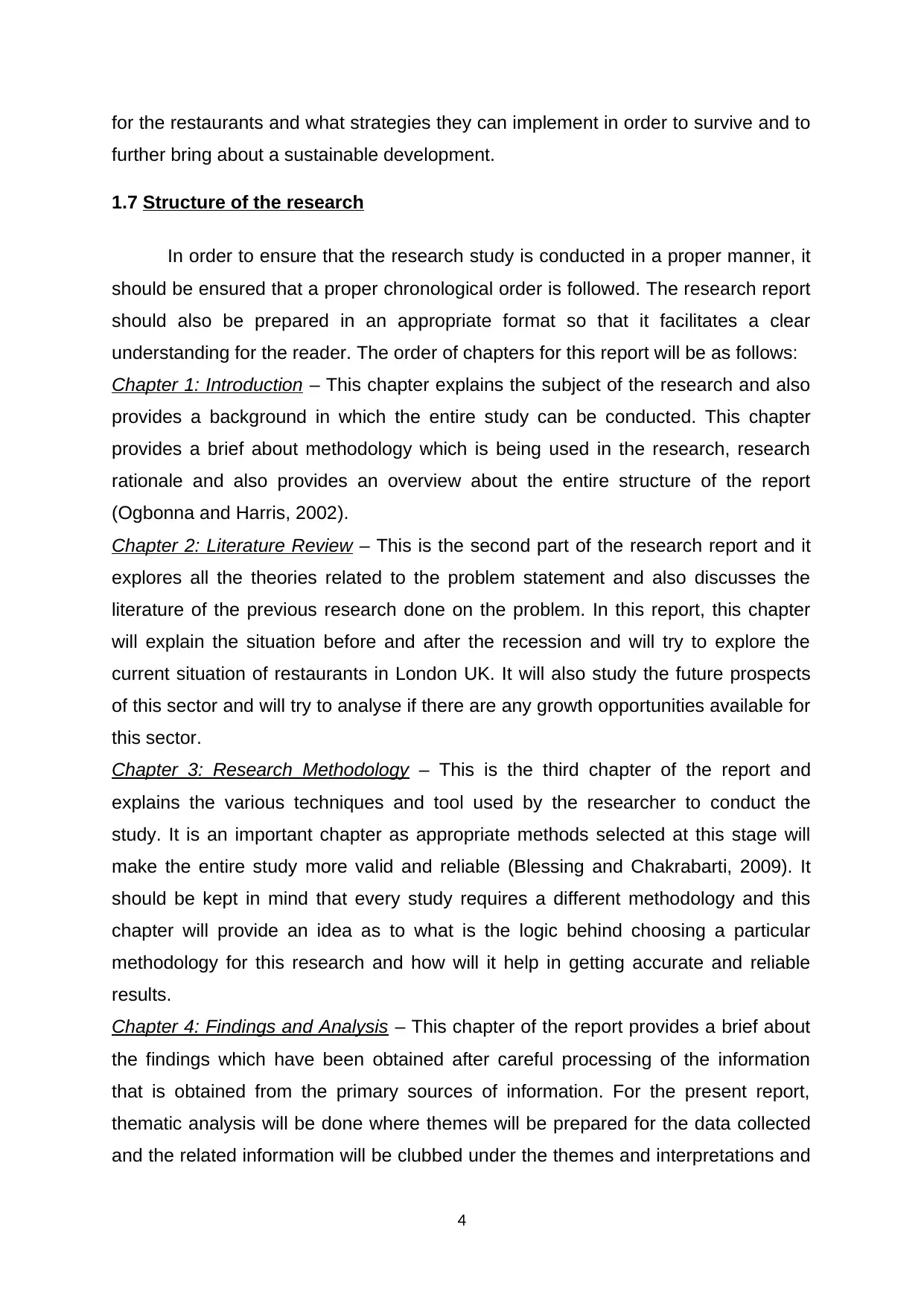
for the restaurants and what strategies they can implement in order to survive and to
further bring about a sustainable development.
1.7 Structure of the research
In order to ensure that the research study is conducted in a proper manner, it
should be ensured that a proper chronological order is followed. The research report
should also be prepared in an appropriate format so that it facilitates a clear
understanding for the reader. The order of chapters for this report will be as follows:
Chapter 1: Introduction – This chapter explains the subject of the research and also
provides a background in which the entire study can be conducted. This chapter
provides a brief about methodology which is being used in the research, research
rationale and also provides an overview about the entire structure of the report
(Ogbonna and Harris, 2002).
Chapter 2: Literature Review – This is the second part of the research report and it
explores all the theories related to the problem statement and also discusses the
literature of the previous research done on the problem. In this report, this chapter
will explain the situation before and after the recession and will try to explore the
current situation of restaurants in London UK. It will also study the future prospects
of this sector and will try to analyse if there are any growth opportunities available for
this sector.
Chapter 3: Research Methodology – This is the third chapter of the report and
explains the various techniques and tool used by the researcher to conduct the
study. It is an important chapter as appropriate methods selected at this stage will
make the entire study more valid and reliable (Blessing and Chakrabarti, 2009). It
should be kept in mind that every study requires a different methodology and this
chapter will provide an idea as to what is the logic behind choosing a particular
methodology for this research and how will it help in getting accurate and reliable
results.
Chapter 4: Findings and Analysis – This chapter of the report provides a brief about
the findings which have been obtained after careful processing of the information
that is obtained from the primary sources of information. For the present report,
thematic analysis will be done where themes will be prepared for the data collected
and the related information will be clubbed under the themes and interpretations and
4
further bring about a sustainable development.
1.7 Structure of the research
In order to ensure that the research study is conducted in a proper manner, it
should be ensured that a proper chronological order is followed. The research report
should also be prepared in an appropriate format so that it facilitates a clear
understanding for the reader. The order of chapters for this report will be as follows:
Chapter 1: Introduction – This chapter explains the subject of the research and also
provides a background in which the entire study can be conducted. This chapter
provides a brief about methodology which is being used in the research, research
rationale and also provides an overview about the entire structure of the report
(Ogbonna and Harris, 2002).
Chapter 2: Literature Review – This is the second part of the research report and it
explores all the theories related to the problem statement and also discusses the
literature of the previous research done on the problem. In this report, this chapter
will explain the situation before and after the recession and will try to explore the
current situation of restaurants in London UK. It will also study the future prospects
of this sector and will try to analyse if there are any growth opportunities available for
this sector.
Chapter 3: Research Methodology – This is the third chapter of the report and
explains the various techniques and tool used by the researcher to conduct the
study. It is an important chapter as appropriate methods selected at this stage will
make the entire study more valid and reliable (Blessing and Chakrabarti, 2009). It
should be kept in mind that every study requires a different methodology and this
chapter will provide an idea as to what is the logic behind choosing a particular
methodology for this research and how will it help in getting accurate and reliable
results.
Chapter 4: Findings and Analysis – This chapter of the report provides a brief about
the findings which have been obtained after careful processing of the information
that is obtained from the primary sources of information. For the present report,
thematic analysis will be done where themes will be prepared for the data collected
and the related information will be clubbed under the themes and interpretations and
4
Paraphrase This Document
Need a fresh take? Get an instant paraphrase of this document with our AI Paraphraser
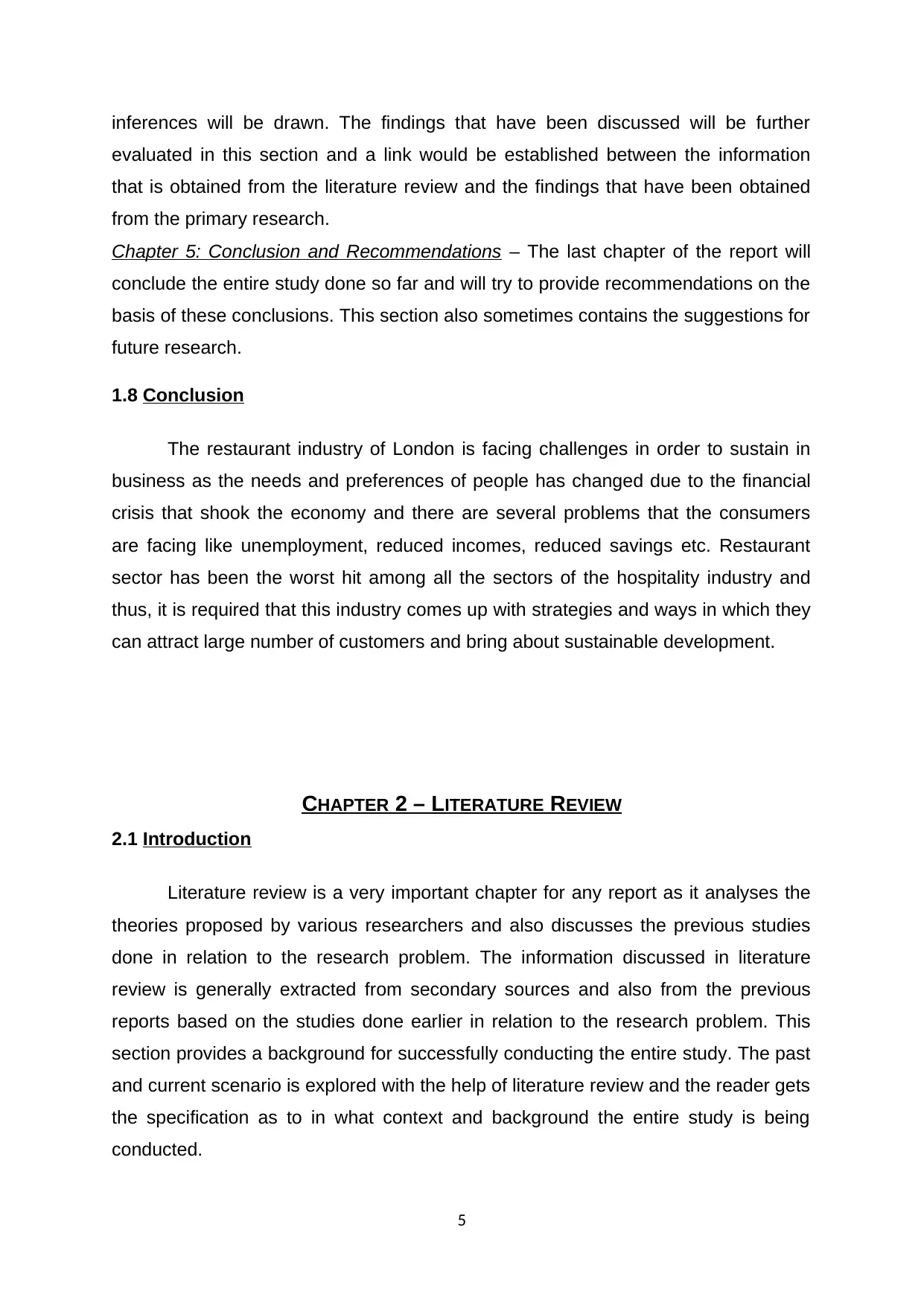
inferences will be drawn. The findings that have been discussed will be further
evaluated in this section and a link would be established between the information
that is obtained from the literature review and the findings that have been obtained
from the primary research.
Chapter 5: Conclusion and Recommendations – The last chapter of the report will
conclude the entire study done so far and will try to provide recommendations on the
basis of these conclusions. This section also sometimes contains the suggestions for
future research.
1.8 Conclusion
The restaurant industry of London is facing challenges in order to sustain in
business as the needs and preferences of people has changed due to the financial
crisis that shook the economy and there are several problems that the consumers
are facing like unemployment, reduced incomes, reduced savings etc. Restaurant
sector has been the worst hit among all the sectors of the hospitality industry and
thus, it is required that this industry comes up with strategies and ways in which they
can attract large number of customers and bring about sustainable development.
CHAPTER 2 – LITERATURE REVIEW
2.1 Introduction
Literature review is a very important chapter for any report as it analyses the
theories proposed by various researchers and also discusses the previous studies
done in relation to the research problem. The information discussed in literature
review is generally extracted from secondary sources and also from the previous
reports based on the studies done earlier in relation to the research problem. This
section provides a background for successfully conducting the entire study. The past
and current scenario is explored with the help of literature review and the reader gets
the specification as to in what context and background the entire study is being
conducted.
5
evaluated in this section and a link would be established between the information
that is obtained from the literature review and the findings that have been obtained
from the primary research.
Chapter 5: Conclusion and Recommendations – The last chapter of the report will
conclude the entire study done so far and will try to provide recommendations on the
basis of these conclusions. This section also sometimes contains the suggestions for
future research.
1.8 Conclusion
The restaurant industry of London is facing challenges in order to sustain in
business as the needs and preferences of people has changed due to the financial
crisis that shook the economy and there are several problems that the consumers
are facing like unemployment, reduced incomes, reduced savings etc. Restaurant
sector has been the worst hit among all the sectors of the hospitality industry and
thus, it is required that this industry comes up with strategies and ways in which they
can attract large number of customers and bring about sustainable development.
CHAPTER 2 – LITERATURE REVIEW
2.1 Introduction
Literature review is a very important chapter for any report as it analyses the
theories proposed by various researchers and also discusses the previous studies
done in relation to the research problem. The information discussed in literature
review is generally extracted from secondary sources and also from the previous
reports based on the studies done earlier in relation to the research problem. This
section provides a background for successfully conducting the entire study. The past
and current scenario is explored with the help of literature review and the reader gets
the specification as to in what context and background the entire study is being
conducted.
5
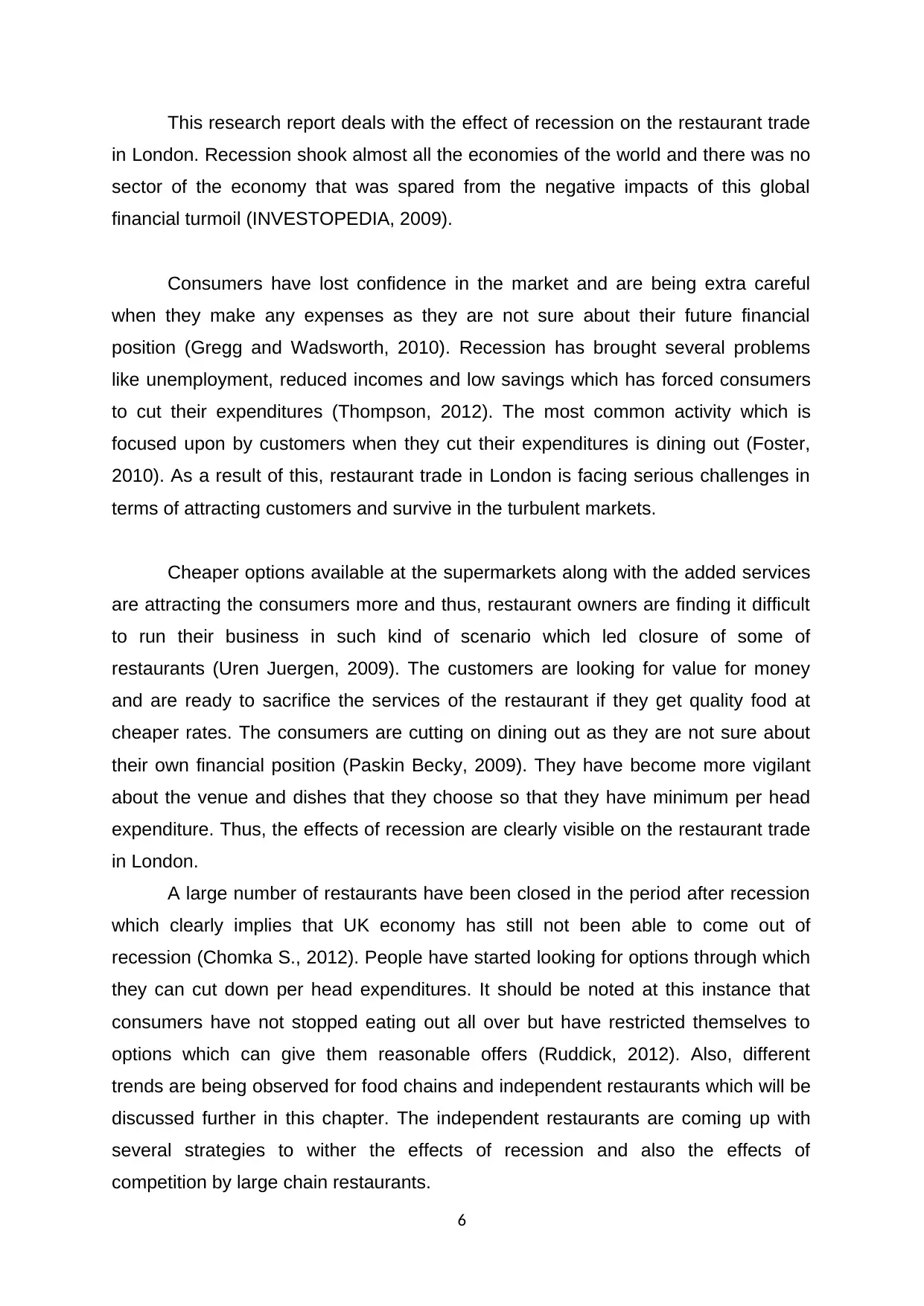
This research report deals with the effect of recession on the restaurant trade
in London. Recession shook almost all the economies of the world and there was no
sector of the economy that was spared from the negative impacts of this global
financial turmoil (INVESTOPEDIA, 2009).
Consumers have lost confidence in the market and are being extra careful
when they make any expenses as they are not sure about their future financial
position (Gregg and Wadsworth, 2010). Recession has brought several problems
like unemployment, reduced incomes and low savings which has forced consumers
to cut their expenditures (Thompson, 2012). The most common activity which is
focused upon by customers when they cut their expenditures is dining out (Foster,
2010). As a result of this, restaurant trade in London is facing serious challenges in
terms of attracting customers and survive in the turbulent markets.
Cheaper options available at the supermarkets along with the added services
are attracting the consumers more and thus, restaurant owners are finding it difficult
to run their business in such kind of scenario which led closure of some of
restaurants (Uren Juergen, 2009). The customers are looking for value for money
and are ready to sacrifice the services of the restaurant if they get quality food at
cheaper rates. The consumers are cutting on dining out as they are not sure about
their own financial position (Paskin Becky, 2009). They have become more vigilant
about the venue and dishes that they choose so that they have minimum per head
expenditure. Thus, the effects of recession are clearly visible on the restaurant trade
in London.
A large number of restaurants have been closed in the period after recession
which clearly implies that UK economy has still not been able to come out of
recession (Chomka S., 2012). People have started looking for options through which
they can cut down per head expenditures. It should be noted at this instance that
consumers have not stopped eating out all over but have restricted themselves to
options which can give them reasonable offers (Ruddick, 2012). Also, different
trends are being observed for food chains and independent restaurants which will be
discussed further in this chapter. The independent restaurants are coming up with
several strategies to wither the effects of recession and also the effects of
competition by large chain restaurants.
6
in London. Recession shook almost all the economies of the world and there was no
sector of the economy that was spared from the negative impacts of this global
financial turmoil (INVESTOPEDIA, 2009).
Consumers have lost confidence in the market and are being extra careful
when they make any expenses as they are not sure about their future financial
position (Gregg and Wadsworth, 2010). Recession has brought several problems
like unemployment, reduced incomes and low savings which has forced consumers
to cut their expenditures (Thompson, 2012). The most common activity which is
focused upon by customers when they cut their expenditures is dining out (Foster,
2010). As a result of this, restaurant trade in London is facing serious challenges in
terms of attracting customers and survive in the turbulent markets.
Cheaper options available at the supermarkets along with the added services
are attracting the consumers more and thus, restaurant owners are finding it difficult
to run their business in such kind of scenario which led closure of some of
restaurants (Uren Juergen, 2009). The customers are looking for value for money
and are ready to sacrifice the services of the restaurant if they get quality food at
cheaper rates. The consumers are cutting on dining out as they are not sure about
their own financial position (Paskin Becky, 2009). They have become more vigilant
about the venue and dishes that they choose so that they have minimum per head
expenditure. Thus, the effects of recession are clearly visible on the restaurant trade
in London.
A large number of restaurants have been closed in the period after recession
which clearly implies that UK economy has still not been able to come out of
recession (Chomka S., 2012). People have started looking for options through which
they can cut down per head expenditures. It should be noted at this instance that
consumers have not stopped eating out all over but have restricted themselves to
options which can give them reasonable offers (Ruddick, 2012). Also, different
trends are being observed for food chains and independent restaurants which will be
discussed further in this chapter. The independent restaurants are coming up with
several strategies to wither the effects of recession and also the effects of
competition by large chain restaurants.
6
⊘ This is a preview!⊘
Do you want full access?
Subscribe today to unlock all pages.

Trusted by 1+ million students worldwide
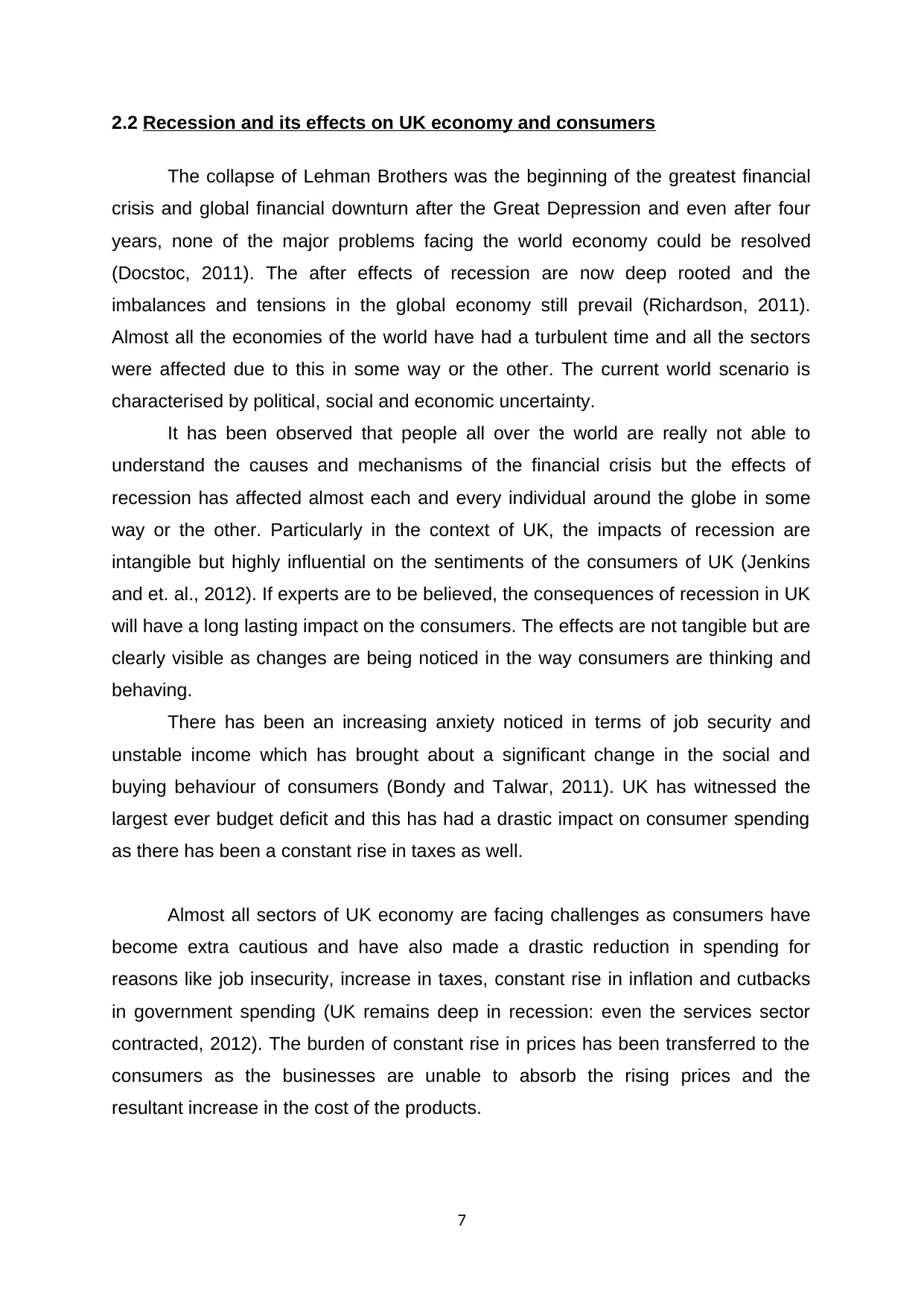
2.2 Recession and its effects on UK economy and consumers
The collapse of Lehman Brothers was the beginning of the greatest financial
crisis and global financial downturn after the Great Depression and even after four
years, none of the major problems facing the world economy could be resolved
(Docstoc, 2011). The after effects of recession are now deep rooted and the
imbalances and tensions in the global economy still prevail (Richardson, 2011).
Almost all the economies of the world have had a turbulent time and all the sectors
were affected due to this in some way or the other. The current world scenario is
characterised by political, social and economic uncertainty.
It has been observed that people all over the world are really not able to
understand the causes and mechanisms of the financial crisis but the effects of
recession has affected almost each and every individual around the globe in some
way or the other. Particularly in the context of UK, the impacts of recession are
intangible but highly influential on the sentiments of the consumers of UK (Jenkins
and et. al., 2012). If experts are to be believed, the consequences of recession in UK
will have a long lasting impact on the consumers. The effects are not tangible but are
clearly visible as changes are being noticed in the way consumers are thinking and
behaving.
There has been an increasing anxiety noticed in terms of job security and
unstable income which has brought about a significant change in the social and
buying behaviour of consumers (Bondy and Talwar, 2011). UK has witnessed the
largest ever budget deficit and this has had a drastic impact on consumer spending
as there has been a constant rise in taxes as well.
Almost all sectors of UK economy are facing challenges as consumers have
become extra cautious and have also made a drastic reduction in spending for
reasons like job insecurity, increase in taxes, constant rise in inflation and cutbacks
in government spending (UK remains deep in recession: even the services sector
contracted, 2012). The burden of constant rise in prices has been transferred to the
consumers as the businesses are unable to absorb the rising prices and the
resultant increase in the cost of the products.
7
The collapse of Lehman Brothers was the beginning of the greatest financial
crisis and global financial downturn after the Great Depression and even after four
years, none of the major problems facing the world economy could be resolved
(Docstoc, 2011). The after effects of recession are now deep rooted and the
imbalances and tensions in the global economy still prevail (Richardson, 2011).
Almost all the economies of the world have had a turbulent time and all the sectors
were affected due to this in some way or the other. The current world scenario is
characterised by political, social and economic uncertainty.
It has been observed that people all over the world are really not able to
understand the causes and mechanisms of the financial crisis but the effects of
recession has affected almost each and every individual around the globe in some
way or the other. Particularly in the context of UK, the impacts of recession are
intangible but highly influential on the sentiments of the consumers of UK (Jenkins
and et. al., 2012). If experts are to be believed, the consequences of recession in UK
will have a long lasting impact on the consumers. The effects are not tangible but are
clearly visible as changes are being noticed in the way consumers are thinking and
behaving.
There has been an increasing anxiety noticed in terms of job security and
unstable income which has brought about a significant change in the social and
buying behaviour of consumers (Bondy and Talwar, 2011). UK has witnessed the
largest ever budget deficit and this has had a drastic impact on consumer spending
as there has been a constant rise in taxes as well.
Almost all sectors of UK economy are facing challenges as consumers have
become extra cautious and have also made a drastic reduction in spending for
reasons like job insecurity, increase in taxes, constant rise in inflation and cutbacks
in government spending (UK remains deep in recession: even the services sector
contracted, 2012). The burden of constant rise in prices has been transferred to the
consumers as the businesses are unable to absorb the rising prices and the
resultant increase in the cost of the products.
7
Paraphrase This Document
Need a fresh take? Get an instant paraphrase of this document with our AI Paraphraser
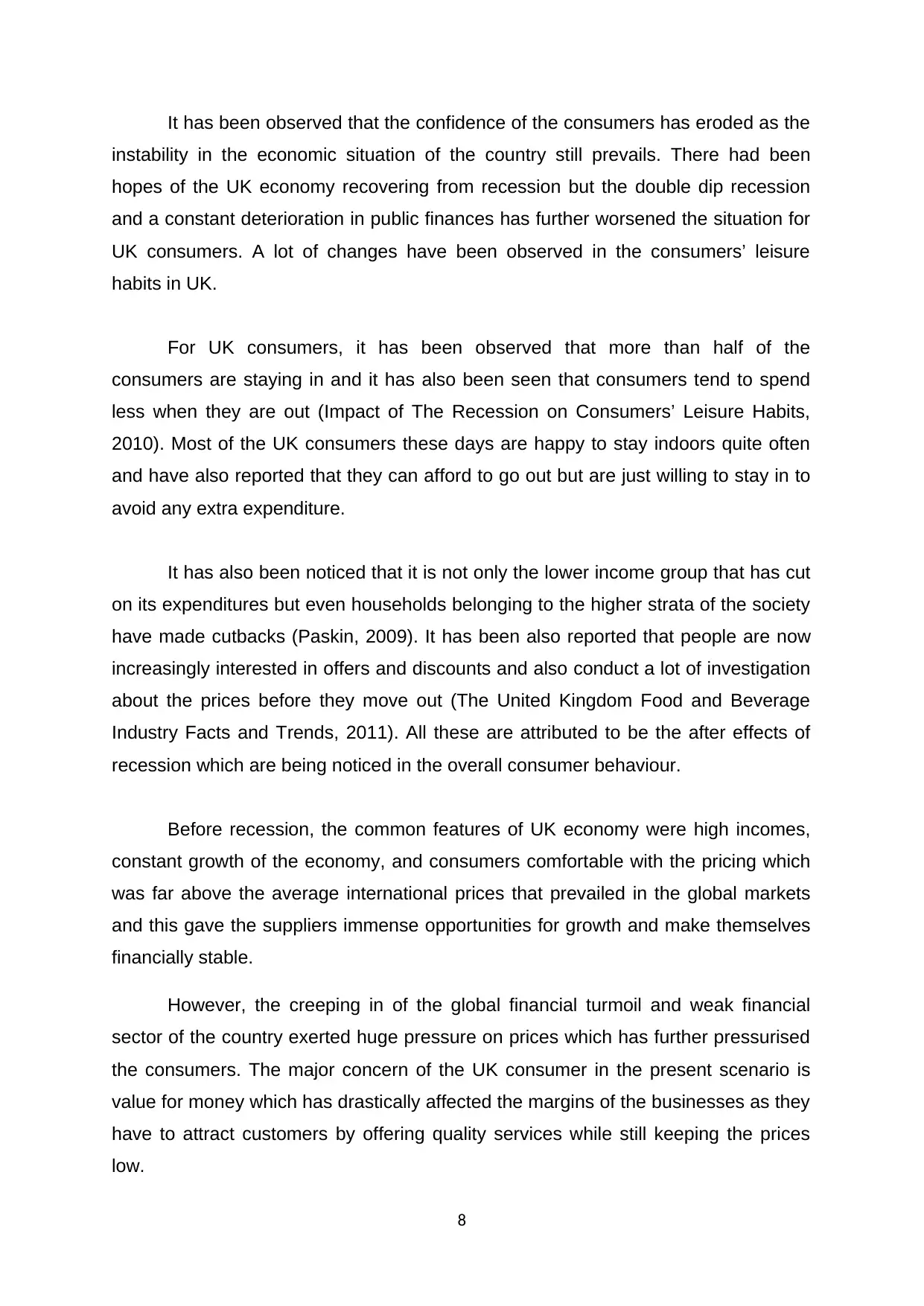
It has been observed that the confidence of the consumers has eroded as the
instability in the economic situation of the country still prevails. There had been
hopes of the UK economy recovering from recession but the double dip recession
and a constant deterioration in public finances has further worsened the situation for
UK consumers. A lot of changes have been observed in the consumers’ leisure
habits in UK.
For UK consumers, it has been observed that more than half of the
consumers are staying in and it has also been seen that consumers tend to spend
less when they are out (Impact of The Recession on Consumers’ Leisure Habits,
2010). Most of the UK consumers these days are happy to stay indoors quite often
and have also reported that they can afford to go out but are just willing to stay in to
avoid any extra expenditure.
It has also been noticed that it is not only the lower income group that has cut
on its expenditures but even households belonging to the higher strata of the society
have made cutbacks (Paskin, 2009). It has been also reported that people are now
increasingly interested in offers and discounts and also conduct a lot of investigation
about the prices before they move out (The United Kingdom Food and Beverage
Industry Facts and Trends, 2011). All these are attributed to be the after effects of
recession which are being noticed in the overall consumer behaviour.
Before recession, the common features of UK economy were high incomes,
constant growth of the economy, and consumers comfortable with the pricing which
was far above the average international prices that prevailed in the global markets
and this gave the suppliers immense opportunities for growth and make themselves
financially stable.
However, the creeping in of the global financial turmoil and weak financial
sector of the country exerted huge pressure on prices which has further pressurised
the consumers. The major concern of the UK consumer in the present scenario is
value for money which has drastically affected the margins of the businesses as they
have to attract customers by offering quality services while still keeping the prices
low.
8
instability in the economic situation of the country still prevails. There had been
hopes of the UK economy recovering from recession but the double dip recession
and a constant deterioration in public finances has further worsened the situation for
UK consumers. A lot of changes have been observed in the consumers’ leisure
habits in UK.
For UK consumers, it has been observed that more than half of the
consumers are staying in and it has also been seen that consumers tend to spend
less when they are out (Impact of The Recession on Consumers’ Leisure Habits,
2010). Most of the UK consumers these days are happy to stay indoors quite often
and have also reported that they can afford to go out but are just willing to stay in to
avoid any extra expenditure.
It has also been noticed that it is not only the lower income group that has cut
on its expenditures but even households belonging to the higher strata of the society
have made cutbacks (Paskin, 2009). It has been also reported that people are now
increasingly interested in offers and discounts and also conduct a lot of investigation
about the prices before they move out (The United Kingdom Food and Beverage
Industry Facts and Trends, 2011). All these are attributed to be the after effects of
recession which are being noticed in the overall consumer behaviour.
Before recession, the common features of UK economy were high incomes,
constant growth of the economy, and consumers comfortable with the pricing which
was far above the average international prices that prevailed in the global markets
and this gave the suppliers immense opportunities for growth and make themselves
financially stable.
However, the creeping in of the global financial turmoil and weak financial
sector of the country exerted huge pressure on prices which has further pressurised
the consumers. The major concern of the UK consumer in the present scenario is
value for money which has drastically affected the margins of the businesses as they
have to attract customers by offering quality services while still keeping the prices
low.
8
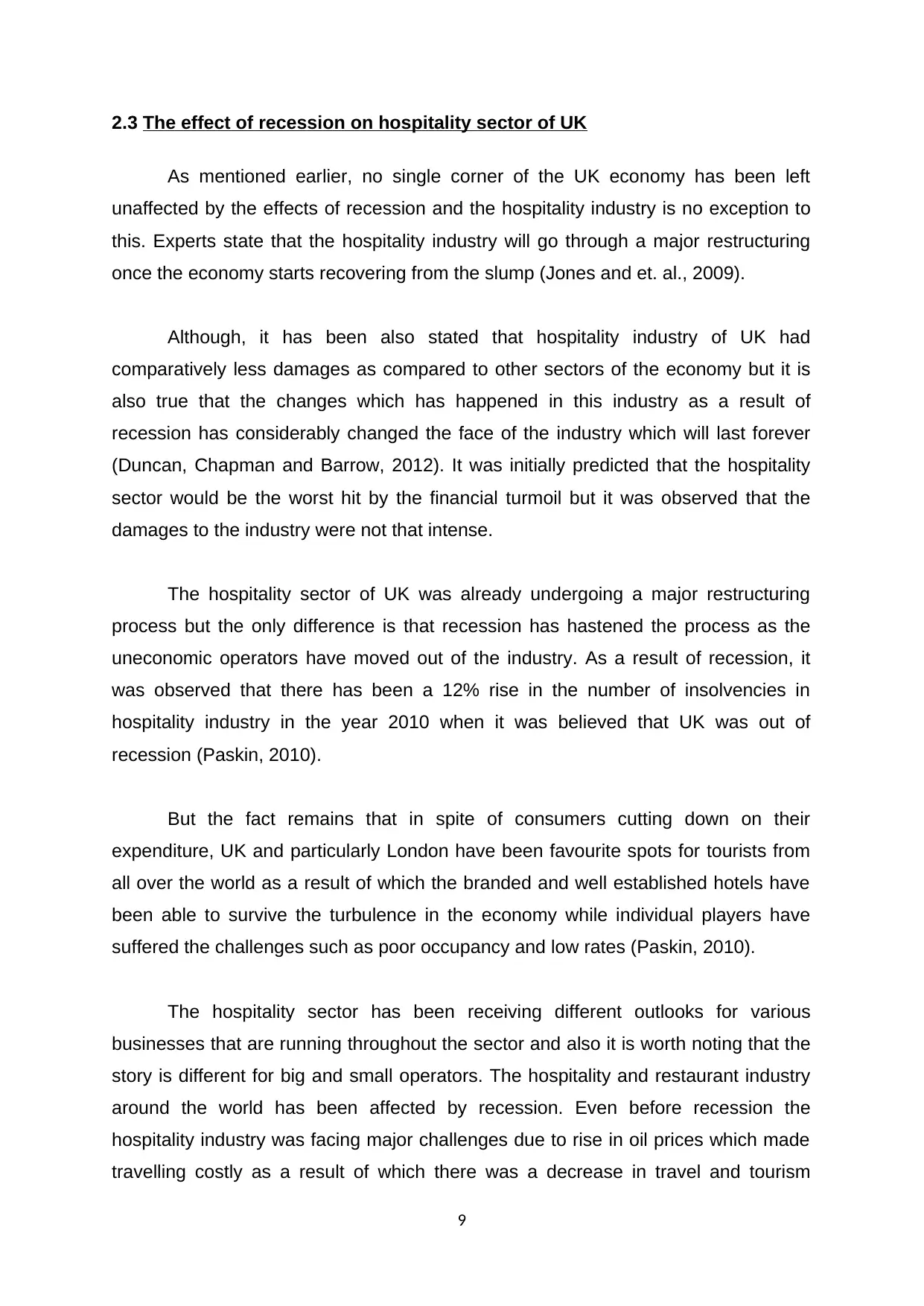
2.3 The effect of recession on hospitality sector of UK
As mentioned earlier, no single corner of the UK economy has been left
unaffected by the effects of recession and the hospitality industry is no exception to
this. Experts state that the hospitality industry will go through a major restructuring
once the economy starts recovering from the slump (Jones and et. al., 2009).
Although, it has been also stated that hospitality industry of UK had
comparatively less damages as compared to other sectors of the economy but it is
also true that the changes which has happened in this industry as a result of
recession has considerably changed the face of the industry which will last forever
(Duncan, Chapman and Barrow, 2012). It was initially predicted that the hospitality
sector would be the worst hit by the financial turmoil but it was observed that the
damages to the industry were not that intense.
The hospitality sector of UK was already undergoing a major restructuring
process but the only difference is that recession has hastened the process as the
uneconomic operators have moved out of the industry. As a result of recession, it
was observed that there has been a 12% rise in the number of insolvencies in
hospitality industry in the year 2010 when it was believed that UK was out of
recession (Paskin, 2010).
But the fact remains that in spite of consumers cutting down on their
expenditure, UK and particularly London have been favourite spots for tourists from
all over the world as a result of which the branded and well established hotels have
been able to survive the turbulence in the economy while individual players have
suffered the challenges such as poor occupancy and low rates (Paskin, 2010).
The hospitality sector has been receiving different outlooks for various
businesses that are running throughout the sector and also it is worth noting that the
story is different for big and small operators. The hospitality and restaurant industry
around the world has been affected by recession. Even before recession the
hospitality industry was facing major challenges due to rise in oil prices which made
travelling costly as a result of which there was a decrease in travel and tourism
9
As mentioned earlier, no single corner of the UK economy has been left
unaffected by the effects of recession and the hospitality industry is no exception to
this. Experts state that the hospitality industry will go through a major restructuring
once the economy starts recovering from the slump (Jones and et. al., 2009).
Although, it has been also stated that hospitality industry of UK had
comparatively less damages as compared to other sectors of the economy but it is
also true that the changes which has happened in this industry as a result of
recession has considerably changed the face of the industry which will last forever
(Duncan, Chapman and Barrow, 2012). It was initially predicted that the hospitality
sector would be the worst hit by the financial turmoil but it was observed that the
damages to the industry were not that intense.
The hospitality sector of UK was already undergoing a major restructuring
process but the only difference is that recession has hastened the process as the
uneconomic operators have moved out of the industry. As a result of recession, it
was observed that there has been a 12% rise in the number of insolvencies in
hospitality industry in the year 2010 when it was believed that UK was out of
recession (Paskin, 2010).
But the fact remains that in spite of consumers cutting down on their
expenditure, UK and particularly London have been favourite spots for tourists from
all over the world as a result of which the branded and well established hotels have
been able to survive the turbulence in the economy while individual players have
suffered the challenges such as poor occupancy and low rates (Paskin, 2010).
The hospitality sector has been receiving different outlooks for various
businesses that are running throughout the sector and also it is worth noting that the
story is different for big and small operators. The hospitality and restaurant industry
around the world has been affected by recession. Even before recession the
hospitality industry was facing major challenges due to rise in oil prices which made
travelling costly as a result of which there was a decrease in travel and tourism
9
⊘ This is a preview!⊘
Do you want full access?
Subscribe today to unlock all pages.

Trusted by 1+ million students worldwide
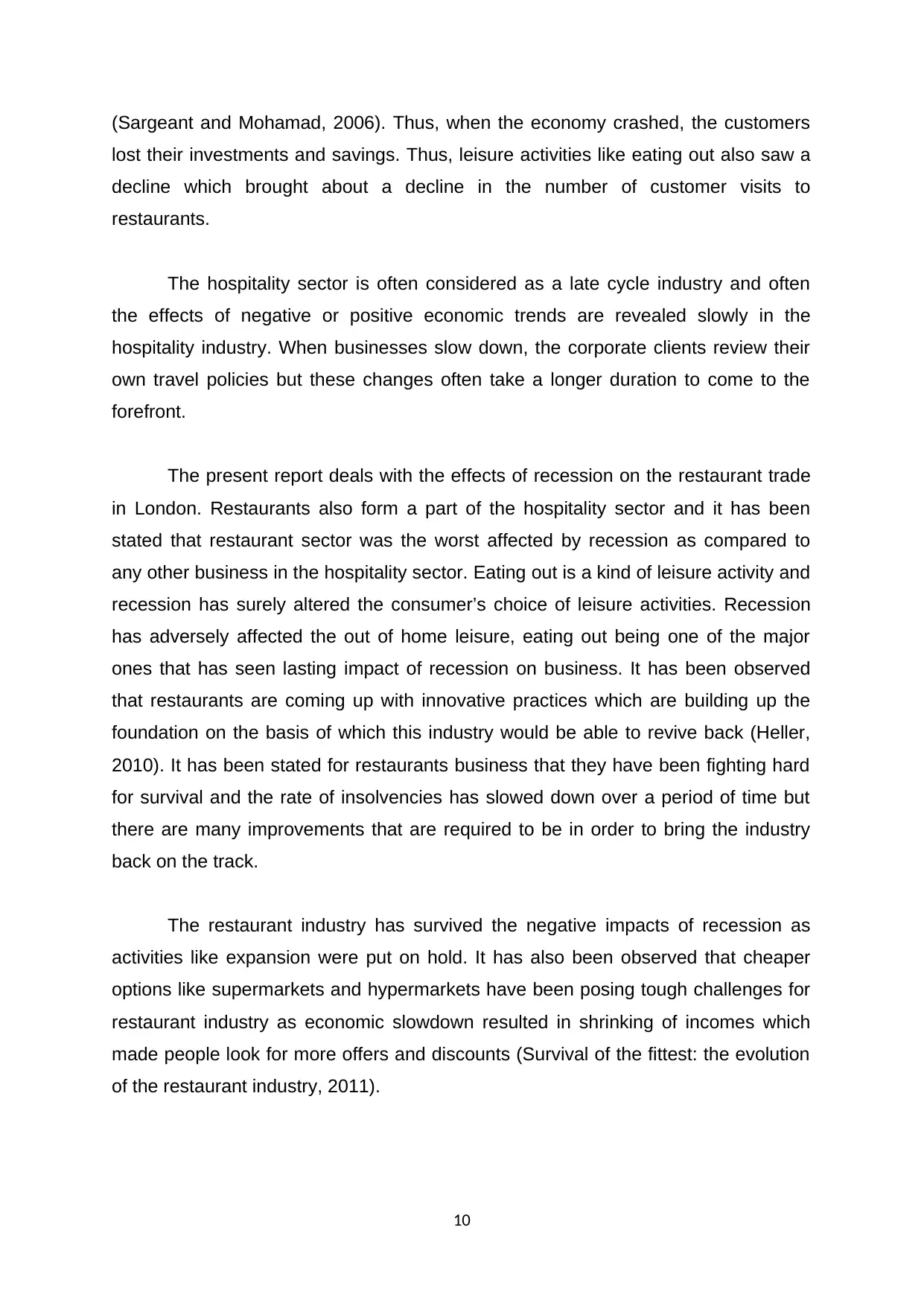
(Sargeant and Mohamad, 2006). Thus, when the economy crashed, the customers
lost their investments and savings. Thus, leisure activities like eating out also saw a
decline which brought about a decline in the number of customer visits to
restaurants.
The hospitality sector is often considered as a late cycle industry and often
the effects of negative or positive economic trends are revealed slowly in the
hospitality industry. When businesses slow down, the corporate clients review their
own travel policies but these changes often take a longer duration to come to the
forefront.
The present report deals with the effects of recession on the restaurant trade
in London. Restaurants also form a part of the hospitality sector and it has been
stated that restaurant sector was the worst affected by recession as compared to
any other business in the hospitality sector. Eating out is a kind of leisure activity and
recession has surely altered the consumer’s choice of leisure activities. Recession
has adversely affected the out of home leisure, eating out being one of the major
ones that has seen lasting impact of recession on business. It has been observed
that restaurants are coming up with innovative practices which are building up the
foundation on the basis of which this industry would be able to revive back (Heller,
2010). It has been stated for restaurants business that they have been fighting hard
for survival and the rate of insolvencies has slowed down over a period of time but
there are many improvements that are required to be in order to bring the industry
back on the track.
The restaurant industry has survived the negative impacts of recession as
activities like expansion were put on hold. It has also been observed that cheaper
options like supermarkets and hypermarkets have been posing tough challenges for
restaurant industry as economic slowdown resulted in shrinking of incomes which
made people look for more offers and discounts (Survival of the fittest: the evolution
of the restaurant industry, 2011).
10
lost their investments and savings. Thus, leisure activities like eating out also saw a
decline which brought about a decline in the number of customer visits to
restaurants.
The hospitality sector is often considered as a late cycle industry and often
the effects of negative or positive economic trends are revealed slowly in the
hospitality industry. When businesses slow down, the corporate clients review their
own travel policies but these changes often take a longer duration to come to the
forefront.
The present report deals with the effects of recession on the restaurant trade
in London. Restaurants also form a part of the hospitality sector and it has been
stated that restaurant sector was the worst affected by recession as compared to
any other business in the hospitality sector. Eating out is a kind of leisure activity and
recession has surely altered the consumer’s choice of leisure activities. Recession
has adversely affected the out of home leisure, eating out being one of the major
ones that has seen lasting impact of recession on business. It has been observed
that restaurants are coming up with innovative practices which are building up the
foundation on the basis of which this industry would be able to revive back (Heller,
2010). It has been stated for restaurants business that they have been fighting hard
for survival and the rate of insolvencies has slowed down over a period of time but
there are many improvements that are required to be in order to bring the industry
back on the track.
The restaurant industry has survived the negative impacts of recession as
activities like expansion were put on hold. It has also been observed that cheaper
options like supermarkets and hypermarkets have been posing tough challenges for
restaurant industry as economic slowdown resulted in shrinking of incomes which
made people look for more offers and discounts (Survival of the fittest: the evolution
of the restaurant industry, 2011).
10
Paraphrase This Document
Need a fresh take? Get an instant paraphrase of this document with our AI Paraphraser
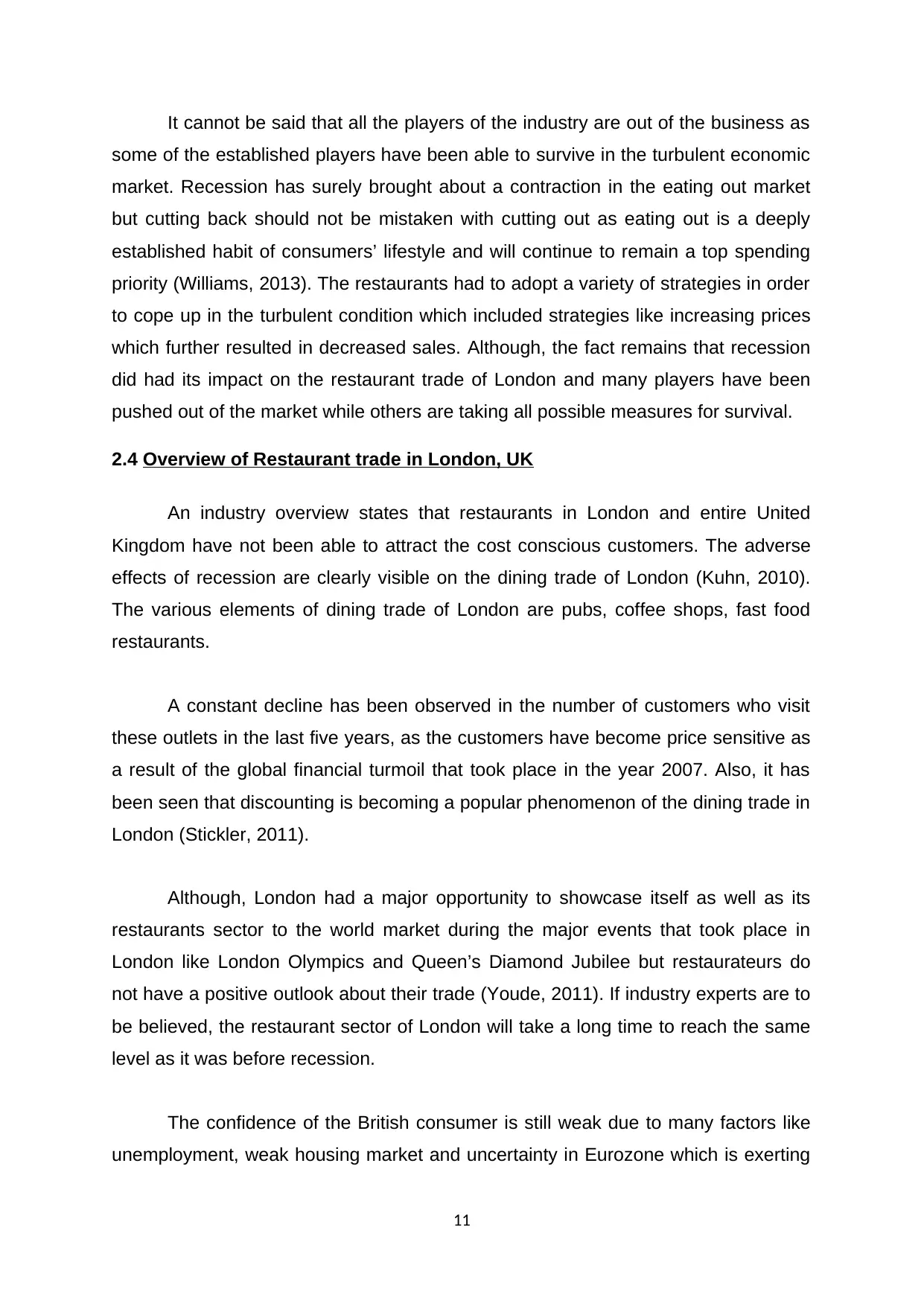
It cannot be said that all the players of the industry are out of the business as
some of the established players have been able to survive in the turbulent economic
market. Recession has surely brought about a contraction in the eating out market
but cutting back should not be mistaken with cutting out as eating out is a deeply
established habit of consumers’ lifestyle and will continue to remain a top spending
priority (Williams, 2013). The restaurants had to adopt a variety of strategies in order
to cope up in the turbulent condition which included strategies like increasing prices
which further resulted in decreased sales. Although, the fact remains that recession
did had its impact on the restaurant trade of London and many players have been
pushed out of the market while others are taking all possible measures for survival.
2.4 Overview of Restaurant trade in London, UK
An industry overview states that restaurants in London and entire United
Kingdom have not been able to attract the cost conscious customers. The adverse
effects of recession are clearly visible on the dining trade of London (Kuhn, 2010).
The various elements of dining trade of London are pubs, coffee shops, fast food
restaurants.
A constant decline has been observed in the number of customers who visit
these outlets in the last five years, as the customers have become price sensitive as
a result of the global financial turmoil that took place in the year 2007. Also, it has
been seen that discounting is becoming a popular phenomenon of the dining trade in
London (Stickler, 2011).
Although, London had a major opportunity to showcase itself as well as its
restaurants sector to the world market during the major events that took place in
London like London Olympics and Queen’s Diamond Jubilee but restaurateurs do
not have a positive outlook about their trade (Youde, 2011). If industry experts are to
be believed, the restaurant sector of London will take a long time to reach the same
level as it was before recession.
The confidence of the British consumer is still weak due to many factors like
unemployment, weak housing market and uncertainty in Eurozone which is exerting
11
some of the established players have been able to survive in the turbulent economic
market. Recession has surely brought about a contraction in the eating out market
but cutting back should not be mistaken with cutting out as eating out is a deeply
established habit of consumers’ lifestyle and will continue to remain a top spending
priority (Williams, 2013). The restaurants had to adopt a variety of strategies in order
to cope up in the turbulent condition which included strategies like increasing prices
which further resulted in decreased sales. Although, the fact remains that recession
did had its impact on the restaurant trade of London and many players have been
pushed out of the market while others are taking all possible measures for survival.
2.4 Overview of Restaurant trade in London, UK
An industry overview states that restaurants in London and entire United
Kingdom have not been able to attract the cost conscious customers. The adverse
effects of recession are clearly visible on the dining trade of London (Kuhn, 2010).
The various elements of dining trade of London are pubs, coffee shops, fast food
restaurants.
A constant decline has been observed in the number of customers who visit
these outlets in the last five years, as the customers have become price sensitive as
a result of the global financial turmoil that took place in the year 2007. Also, it has
been seen that discounting is becoming a popular phenomenon of the dining trade in
London (Stickler, 2011).
Although, London had a major opportunity to showcase itself as well as its
restaurants sector to the world market during the major events that took place in
London like London Olympics and Queen’s Diamond Jubilee but restaurateurs do
not have a positive outlook about their trade (Youde, 2011). If industry experts are to
be believed, the restaurant sector of London will take a long time to reach the same
level as it was before recession.
The confidence of the British consumer is still weak due to many factors like
unemployment, weak housing market and uncertainty in Eurozone which is exerting
11
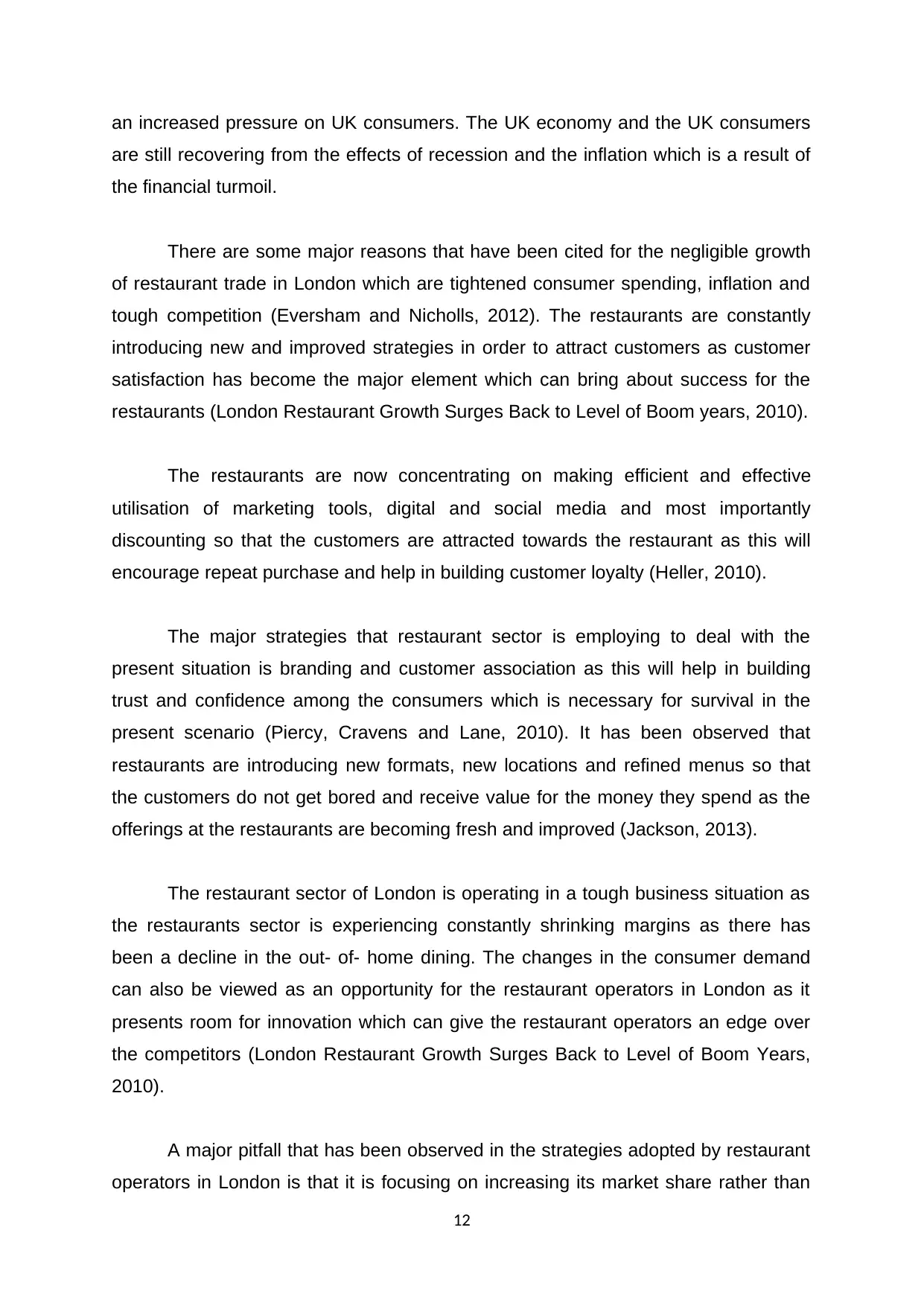
an increased pressure on UK consumers. The UK economy and the UK consumers
are still recovering from the effects of recession and the inflation which is a result of
the financial turmoil.
There are some major reasons that have been cited for the negligible growth
of restaurant trade in London which are tightened consumer spending, inflation and
tough competition (Eversham and Nicholls, 2012). The restaurants are constantly
introducing new and improved strategies in order to attract customers as customer
satisfaction has become the major element which can bring about success for the
restaurants (London Restaurant Growth Surges Back to Level of Boom years, 2010).
The restaurants are now concentrating on making efficient and effective
utilisation of marketing tools, digital and social media and most importantly
discounting so that the customers are attracted towards the restaurant as this will
encourage repeat purchase and help in building customer loyalty (Heller, 2010).
The major strategies that restaurant sector is employing to deal with the
present situation is branding and customer association as this will help in building
trust and confidence among the consumers which is necessary for survival in the
present scenario (Piercy, Cravens and Lane, 2010). It has been observed that
restaurants are introducing new formats, new locations and refined menus so that
the customers do not get bored and receive value for the money they spend as the
offerings at the restaurants are becoming fresh and improved (Jackson, 2013).
The restaurant sector of London is operating in a tough business situation as
the restaurants sector is experiencing constantly shrinking margins as there has
been a decline in the out- of- home dining. The changes in the consumer demand
can also be viewed as an opportunity for the restaurant operators in London as it
presents room for innovation which can give the restaurant operators an edge over
the competitors (London Restaurant Growth Surges Back to Level of Boom Years,
2010).
A major pitfall that has been observed in the strategies adopted by restaurant
operators in London is that it is focusing on increasing its market share rather than
12
are still recovering from the effects of recession and the inflation which is a result of
the financial turmoil.
There are some major reasons that have been cited for the negligible growth
of restaurant trade in London which are tightened consumer spending, inflation and
tough competition (Eversham and Nicholls, 2012). The restaurants are constantly
introducing new and improved strategies in order to attract customers as customer
satisfaction has become the major element which can bring about success for the
restaurants (London Restaurant Growth Surges Back to Level of Boom years, 2010).
The restaurants are now concentrating on making efficient and effective
utilisation of marketing tools, digital and social media and most importantly
discounting so that the customers are attracted towards the restaurant as this will
encourage repeat purchase and help in building customer loyalty (Heller, 2010).
The major strategies that restaurant sector is employing to deal with the
present situation is branding and customer association as this will help in building
trust and confidence among the consumers which is necessary for survival in the
present scenario (Piercy, Cravens and Lane, 2010). It has been observed that
restaurants are introducing new formats, new locations and refined menus so that
the customers do not get bored and receive value for the money they spend as the
offerings at the restaurants are becoming fresh and improved (Jackson, 2013).
The restaurant sector of London is operating in a tough business situation as
the restaurants sector is experiencing constantly shrinking margins as there has
been a decline in the out- of- home dining. The changes in the consumer demand
can also be viewed as an opportunity for the restaurant operators in London as it
presents room for innovation which can give the restaurant operators an edge over
the competitors (London Restaurant Growth Surges Back to Level of Boom Years,
2010).
A major pitfall that has been observed in the strategies adopted by restaurant
operators in London is that it is focusing on increasing its market share rather than
12
⊘ This is a preview!⊘
Do you want full access?
Subscribe today to unlock all pages.

Trusted by 1+ million students worldwide
1 out of 25
Your All-in-One AI-Powered Toolkit for Academic Success.
+13062052269
info@desklib.com
Available 24*7 on WhatsApp / Email
![[object Object]](/_next/static/media/star-bottom.7253800d.svg)
Unlock your academic potential
Copyright © 2020–2026 A2Z Services. All Rights Reserved. Developed and managed by ZUCOL.


